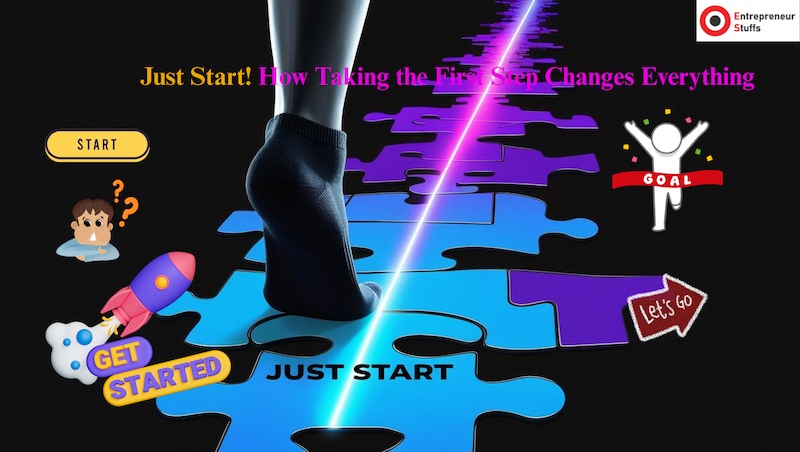Introduction: The Power of the First Step
Every successful entrepreneur, innovator, and business leader has one thing in common—they started before they felt ready. The journey of building a startup, launching a product, or scaling a business begins with a single decision: to take action.
For entrepreneurs and startup founders, the biggest hurdle isn’t a lack of ideas, resources, or even market competition—it’s taking that first step. The fear of failure, perfectionism, or overthinking can paralyze even the most ambitious minds. But the truth is, action beats hesitation every time.
Yet, so many aspiring entrepreneurs remain stuck in the planning phase, waiting for the “perfect” moment. They overanalyze, hesitate, and let fear hold them back. But here’s the truth:
- No one starts as an expert – Every master was once a beginner.
- Perfection is a myth – Progress beats perfection every time.
- Momentum is everything – The first step creates the second, then the third.
In this guide, we’ll explore:
- Why Starting is the Hardest (But Most Crucial) Part
- The Psychological Barriers Holding You Back
- How to Take the First Step (Even If You’re Scared)
- Real-Life Examples of Entrepreneurs Who Started Small
- Actionable Steps to Launch Your Idea Today
By the end, you’ll have the mindset, motivation, and practical steps to stop hesitating and start building.
1. Why Starting is the Hardest (But Most Crucial) Part
The Paralysis of Overthinking
Many entrepreneurs get stuck in analysis paralysis—researching, planning, and second-guessing instead of acting.
- “What if my idea fails?”
- “I need more funding first.”
- “I’ll start when I know more.”
But the reality? You’ll never feel 100% ready. The only way to learn is by doing.
The Myth of the “Perfect” Launch
Airbnb started with an air mattress in a living room.
Amazon began as an online bookstore.
Facebook was just a college networking site.
None of these giants started perfectly—they started small, learned, and scaled.
The Compound Effect of Small Actions
Taking the first step—even a tiny one—creates momentum.
– Day 1: You register a domain name.
– Week 1: You build a simple landing page.
– Month 1: You get your first customer.
Small steps compound into big results.
2. The Psychological Barriers Holding You Back
Fear of Failure
“What if I look stupid?”
“What if I lose money?”
But failure isn’t the enemy—inaction is. Every failure is a lesson that moves you forward.
Fear of Judgment
“What will people think?”
Most people are too busy worrying about themselves to judge you. And even if they do? Successful people were once called crazy too.
Imposter Syndrome
“Who am I to do this?”
Remember: You don’t need permission to start. Expertise comes from experience, not waiting.
Perfectionism
“It’s not good enough yet.”
Done is better than perfect. Launch, then improve.
3. How to Take the First Step (Even If You’re Scared)
Step 1: Break It Down Into Tiny Actions
Instead of “I need to build a full business.” Ask, “What’s the smallest thing I can do today?”
- Research competitors (1 hour)
- Sketch a rough business model (30 mins)
- Talk to one potential customer
Step 2: Validate Before Investing
The Lean Startup Approach:
- Build a Minimum Viable Product (MVP) (e.g., a simple prototype, landing page, or demo).
- Get feedback before spending months (or money) on development.
Step 3: Embrace Imperfect Action
- Write the first draft (even if it’s bad).
- Launch the basic version (even if it’s not fancy).
- Sell before you’re ready (pre-orders, waitlists).
Step 4: Find a Mentor or Community
- Join startup groups (Facebook, LinkedIn, Y Combinator’s Startup School).
- Reach out to experienced entrepreneurs (most are happy to help).
Step 5: Commit Publicly
- Tell friends, “I’m launching X by [date].”
- Post on social media: “Working on [idea]—feedback welcome!”
Accountability forces action.
4. Real-Life Examples of Entrepreneurs Who Started Small
Case Study 1: Airbnb
- Started with an air mattress rental to pay rent.
- First website was basic, even broken at times.
- Today: $100B+ company.
Case Study 2: Spanx
- Sara Blakely cut the feet off pantyhose to create her first prototype.
- Sold out of her apartment before getting into stores.
- Now worth $1.2B.
Case Study 3: Slack
- Began as an internal chat tool for a failed game company.
- Launched publicly only after testing internally.
- Sold for $27.7B to Salesforce.
Moral? Start small, test, then scale.
5. Actionable Steps to Launch Your Idea Today
24-Hour Challenge: Do ONE Thing
- Write down your idea in one sentence.
- Research 3 competitors (see what they do well).
- Talk to one potential customer (ask: “Would you use this?”).
7-Day Challenge: Build Momentum
- Day 1: Define your MVP.
- Day 3: Create a simple landing page (use Carrd, Wix, or Webflow).
- Day 5: Share it with 10 people for feedback.
- Day 7: Iterate & plan next steps.
30-Day Challenge: Launch Something
- Week 1: Finalize MVP.
- Week 2: Get first 10 users (friends, family, beta testers).
- Week 3: Improve based on feedback.
- Week 4: Launch publicly (even if small).
Conclusion: Just Start—Your Future Self Will Thank You
The biggest regret isn’t failure—it’s never trying.
Today’s Question:
- What’s one small step you can take in the next 24 hours?
Remember:
You don’t need permission.
You don’t need to be perfect.
You just need to start.
“The best time to plant a tree was 20 years ago. The second-best time is now.”








“Your writing style is engaging and clear, love it!”
“This article is real
“This is exactly what I was looking for, thank you!”